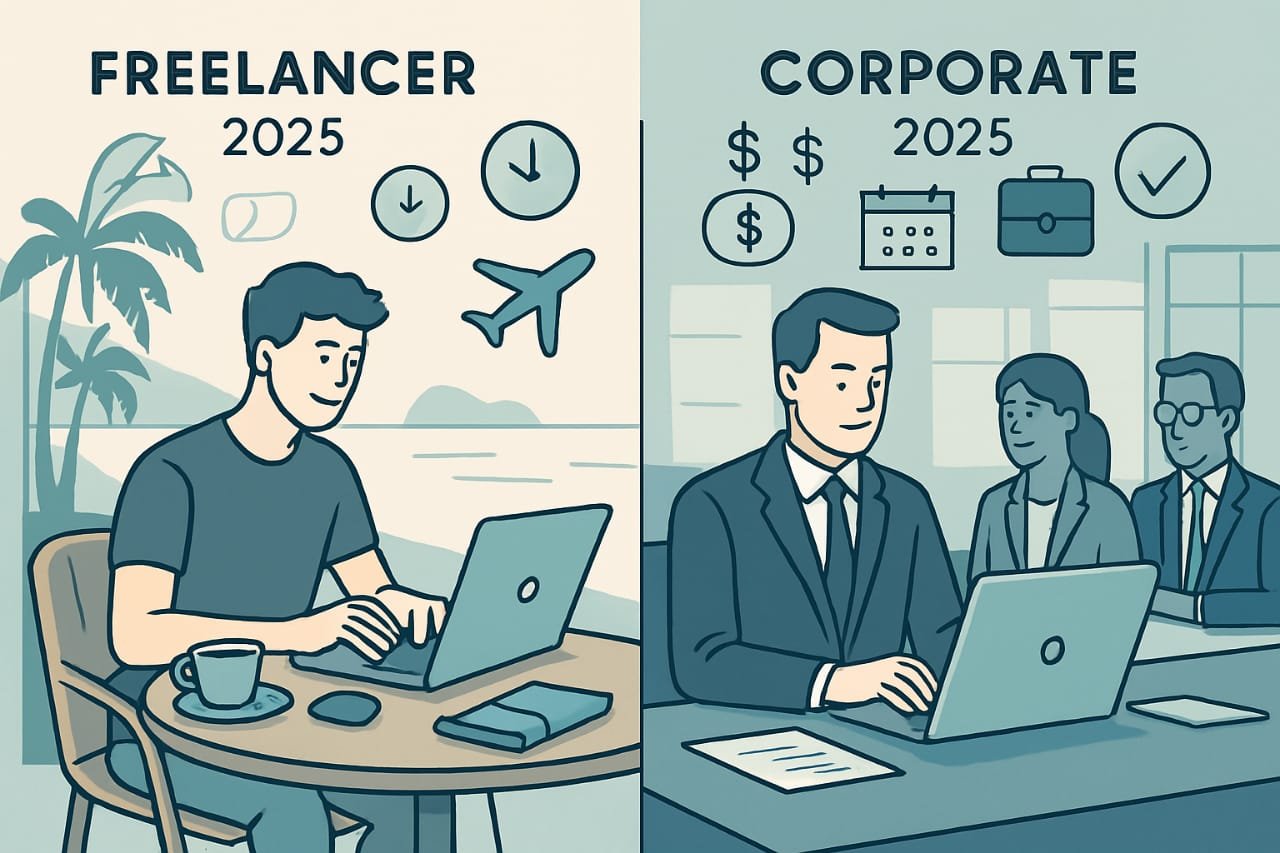Freelancing vs Job: Which Career Path Suits You Best in 2025?
In a world where “work from anywhere” is no longer a luxury but a norm, choosing between freelancing vs job is more than just a career decision—it’s a lifestyle choice.
Do you crave the freedom to set your own hours, pick your clients, and work in your pajamas? Or do you prefer the stability of a monthly paycheck, employee benefits, and structured growth?

As the job market evolves and more professionals seek autonomy and meaning in their work, this debate is louder than ever. Freelancing promises flexibility, but with uncertainty. Traditional jobs offer consistency, but often at the cost of freedom. So, which one is right for you in 2025?
In this post, we’ll dive deep into the freelancing vs job dilemma—comparing the pros, cons, earning potential, growth paths, and real-world insights to help you make an informed decision tailored to your personal goals.
📊 Freelancing vs Job: A Quick Comparison Table
| Feature | Freelancing | Traditional Job |
|---|---|---|
| Freedom & Flexibility | Set your own hours, work from anywhere | Fixed schedule, office presence often needed |
| Income Potential | Variable, can scale significantly | Stable, but growth is often slow |
| Job Security | No guaranteed income or clients | Fixed salary, long-term stability |
| Work-Life Balance | Easier to control (with discipline) | Can be hard due to rigid hours |
| Learning Curve | Fast-paced, hands-on learning | Depends on company culture and resources |
| Growth Opportunities | Unlimited (build a brand/business) | Structured promotions, internal growth |
| Benefits | No perks by default | Health insurance, PF, paid leaves, etc. |
🔍 Understanding the Core Differences in Freelancing vs Job
🧑💻 What is Freelancing in the Freelancing vs Job Debate?
Freelancing means working independently for multiple clients rather than being employed by a single company. You offer specific skills—writing, designing, marketing, coding, etc.—and get paid per project, hour, or retainer.
-
Top freelance careers: Content writing, web development, digital marketing, video editing, and virtual assistance
According to a report by Forbes, over 1.57 billion people worldwide are freelancing. That’s nearly half of the global workforce.
🏢 What is a Traditional Job in the Freelancing vs Job Comparison?
A traditional job involves being employed by an organization with defined roles, responsibilities, and a fixed salary. It typically includes employee benefits, structured work hours, and a long-term commitment.
-
Popular fields: IT, healthcare, finance, education, and engineering
-
Top employers: Google, TCS, Infosys, Amazon, and Reliance
In India, the IT sector alone employed over 5.4 million people in 2024, as per NASSCOM.
🧠 Freelancing vs Job: Deep-Dive into Key Insights
1. 💼 Freedom vs Structure in Freelancing vs Job
-
Freelancing: Total control over when, how, and where you work. Ideal for creatives or those who dislike rigid structures.
-
Job: Offers a clear routine and company culture, which many find reassuring.
💡 Insight: Freedom comes with responsibility. Freelancers need high self-discipline to manage time and avoid burnout.
2. 💰 Earning Potential: Freelancing vs Job Income Prospects
-
Freelancing: Income varies, but top freelancers often earn more than salaried counterparts. You can scale by raising rates, getting clients abroad, or offering premium services.
-
Job: Offers predictable income and financial stability, but raises are often tied to company performance and appraisal cycles.
💡 Personal Perspective: Many freelancers double or triple their previous job income within 2–3 years, but this requires skill upgrades, reputation building, and marketing.
3. 📈 Career Growth Opportunities in Freelancing vs Job
-
Freelancing: You’re the brand. Growth depends on how well you market, niche down, and manage client relationships.
-
Job: Growth is more hierarchical—defined by promotions, titles, and years of experience.

💡 Insight: A freelancer can pivot to entrepreneurship (e.g., agency or product), while an employee may rise to senior leadership but within company constraints.
4. 📚 Skill Development
-
Freelancing: Hands-on learning. You wear multiple hats—marketer, accountant, sales, and service provider.
-
Job: You’re trained in your core skill. Learning may depend on company initiatives or your manager’s support.
💡 Tip: Freelancing teaches business acumen. A job teaches teamwork and process.
5. 🛡️ Security & Benefits
-
Freelancing: No job security, health insurance, or PF—unless you create them for yourself.
-
Job: Security nets like paid leaves, EPF, insurance, and job continuity.
💡 Solution: Freelancers can buy private insurance and invest in retirement tools like mutual funds, SIPs, or NPS.
6. 🧘♂️ Work-Life Balance
-
Freelancing: Can be excellent—but only if boundaries are set.
-
Job: Structured hours, but less personal control over work intensity or overtime.
💡 Real Experience: Many freelancers initially overwork. Learning to say no and building retainer-based income improves lifestyle significantly.
7. 🌐 Global Opportunities
Freelancers can work for global clients, charging in dollars, euros, or pounds. With tools like Payoneer, Wise, and Stripe, international transactions are now easy.
Employees may be limited to local job markets or require transfers for global exposure.
Tip: Use LinkedIn or Toptal to explore freelance opportunities abroad.
🧭 Freelancing vs Job: Which One Should You Choose?
Choose Freelancing If:
-
You value freedom over stability
-
You’re self-disciplined and proactive
-
You want to work from anywhere
-
You’re okay with financial ups and downs
Choose a Job If:
-
You prefer security and structured growth
-
You value company-provided benefits
-
You enjoy working in teams
-
You prefer a defined work-life separation
🧩 Hybrid Options: Best of Both Worlds?
The rise of gig economy and remote jobs has blurred the lines. Many professionals now:
-
Work full-time and freelance on weekends
-
Transition slowly from job to freelance
-
Explore part-time roles for income stability while freelancing
💡 Idea: Platforms like FlexJobs and We Work Remotely offer remote jobs with flexibility, combining perks of both paths.
🖼️ Visual Infographic: Freelancing vs Job Pros & Cons
(Include a visual like the following if posting on your blog)
Pros of Freelancing:
✅ Freedom
✅ Scalable income
✅ Global clients
✅ Skill diversity
Cons of Freelancing:
❌ No fixed income
❌ Self-discipline required
❌ No employer benefits
❌ Isolation risk
Pros of Job:
✅ Steady paycheck
✅ Team collaboration
✅ Structured growth
✅ Employee benefits
Cons of Job:
❌ Less flexibility
❌ Slower income growth
❌ Office politics
❌ Limited creative control
✅ Conclusion: It’s Not Freelancing vs Job — It’s Freelancing or Job?
The right choice depends on your goals, personality, and risk appetite. Neither freelancing nor a job is “better”—they’re just different paths to professional fulfillment.

Some start with jobs, build expertise, and switch to freelancing. Others dive into freelancing from day one and never look back.
Whichever path you choose, the key is clarity. Know your strengths, understand your goals, and embrace continuous learning.
🚀 Ready to Decide Your Path?
Share your thoughts in the comments—are you leaning towards freelancing or job?
Explore our guides on How to Start Freelancing in India or Top Work-From-Home Jobs.
Subscribe to our newsletter for weekly insights, opportunities, and career hacks!
